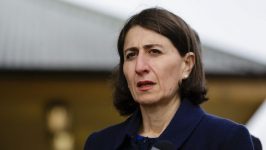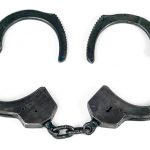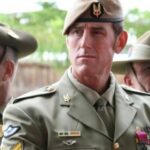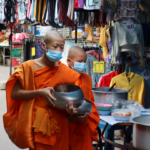NSW Premier Continues Assault on Civil Liberties

The Berejiklian government is continuing its assault on civil liberties with the implementation of a further range of oppressive national security measures. And this time, Gladys’ new counterterrorism policy is aimed firmly at teenagers.
On February 7, the state Coalition government announced it will be spending $6 million on setting up the new countering violent extremism unit within the NSW juvenile justice system. It will be charged with identifying and closely managing “radicalised youth, or those at risk of radicalisation.”
Under the regime, young people deemed to pose a risk to national security will receive intensified communications monitoring, which will include increased screening, as well as restrictions on mail, phone calls and visitors. And at-risk youths will also undergo deradicalisation programs.
Law enforcement agencies will identify juvenile detainees that they perceive are at risk of being radicalised. And selected youths will then receive a national security interest designation, as well as individual case management.
“This is pretty ugly politics,” NSW Greens MLC David Shoebridge said. “Kids are going to see their rights removed, be subjected to intrusive 24 hours surveillance, and have contact with their families greatly restricted.”
And this will be based on the “opinion of a corrective officer, and not founded on credible evidence,” he added. Indeed, these new measures will apply to any youth offender deemed a risk, and not only kids whose offending was terror-related.
Teenage thought crimes
The premier told reporters she wasn’t ruling out broadening laws that allow for the extended detention of adult inmates after their sentences have ended, so that they apply to teens. The future crime laws she referred to are some of the most draconian measures the nation has ever seen.
The NSW government passed the High Risk Offenders Bill last November. Under the laws, an adult offender who’s suspected of posing a “risk of committing a future serious terrorism offence” can have their prison sentence, or parole period, extended for periods of up to three years indefinitely.
These laws don’t just apply to convicted terrorists. They apply to all offenders whose crime is classed as in a “terrorism context.” And the net is so wide that a continuing detention order can be placed on an inmate who has merely associated with an individual who has advocated support for a terrorist act.
According to Shoebridge, the prospect of keeping teenage offenders in prolonged detention after their sentences have expired threatens the criminal justice principle of allowing children to be expunged of their criminal records once they become adults.
This fundamental principle recognises that “children are still effectively learning the rules and getting their moral compass,” the Greens justice spokesperson explained.
“The thought that somebody would potentially spend a lifetime in gaol, because of some foolish and potentially dangerous thing they did when they were a young teenager is a very distressing and grossly unfair proposal,” Mr Shoebridge told Sydney Criminal Lawyers®.
Digging in
NSW counterterrorism minister David Elliott said during the press conference that the young offender deradicalisation program will be a first of its kind in the world. However, in the next breath, he admitted there’s no evidence from “anywhere” that these programs have actually worked.
The youth counterterrorism unit is said to be required due to a number of recent attacks involving self-radicalised youths, as well as the threat posed by an increasing number of terrorists who could potentially flee areas formerly run by the Islamic State.
Baghdad formally declared victory over the Islamic State on December 9.
The minister said the state government is monitoring 100 individuals in the Middle East, including orphans and widows, that could return to Australia. And he also outlined quite prophetically that the war on terrorism is set to continue for another 20 years.
“This investment will prepare NSW for that,” Mr Elliott assured the press.
NSW the premier police state
Over the past seven years, the state Coalition government has been passing draconian law after draconian law, trying to outdo itself. And recently passed shoot to kill laws, public safety order provisions, and investigative detention regulations have further whittled away at basic freedoms.
While extending continuing detention laws so teens can be indefinitely detained, would be the government’s most extreme measure yet. It wouldn’t be the first time that youth in this state have been subjected to oppressive measures for crimes that haven’t been committed, or even thought of.
The NSW police Suspect Targeting Management Plan (STMP) has applied to NSW youth since 2000. Under the program, police officers can suggest that child offenders, or even youths that they consider have the potential to commit a crime in the future, be placed on a secretive supervision list.
Targeted youths are then repeatedly stopped and searched by police. And officers also make regular visits to their homes, regardless of which type of offence, if any, they’ve committed in the past.
Tough on terror politicking
During the announcement of the youth counterterrorism unit, the premier declared that “this has tragedy written all over it.” And it certainly does. These measures, which have widespread implications for all juvenile detainees, are actually being implemented because of just a few.
The state government explained that the scheme is being initiated due to five youth offenders who are currently being detained on terror-related charges in NSW juvenile justice facilities. This is up from zero in 2015.
Mr Shoebridge pointed to the absurdity of the Berejiklian government investing millions of dollars on rolling out “more intrusive surveillance and restrictions of rights” over a handful of kids, whilst there’s no evidence these types of programs actually prevent extremism.
“In the face of the evidence, this kind of singling out and marginalising of a small group of children is likely to further sever relations between them and their families, and the state of NSW,” Shoebridge said.
“This kind of politicised attack on children is likely to foster extremism, not minimise it,” he concluded.








